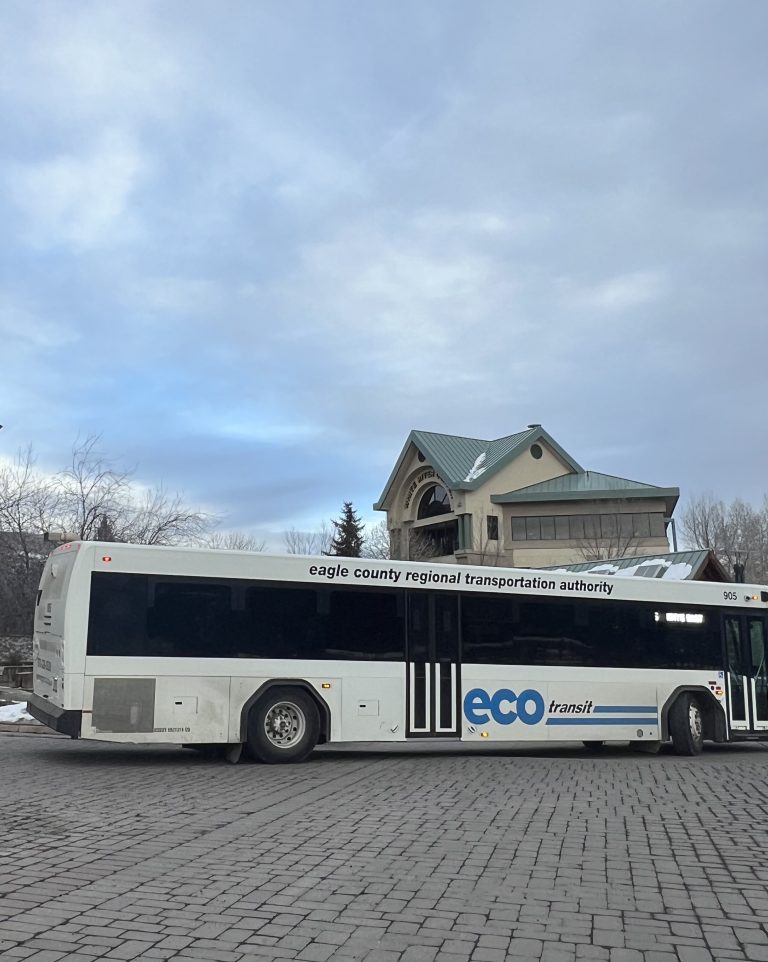
Zoe Goldstein/Vail Daily archive
The Eagle Valley Transportation Authority board this week will review the struggles and triumphs of the last four months of the winter season as ECO Transit prepares to begin its summer service operations, including fare-free service on some routes.
The meeting packet, released ahead of the board’s Wednesday, May 8, meeting, includes planned presentations by ECO Transit and Eagle Valley Transportation Authority staff breaking down statistics from the winter bus service.
Vail-Beaver Creek Express results
The Vail-Beaver Creek Express route, with stops in Beaver Creek Village, Avon Station, Lionshead, and the Vail Transportation Center, went fare-free this winter. It was the first ECO Transit route to go fare-free and served as a test ahead of the goal of implementing fare-free service system-wide.
Certain ECO Transit bus routes — the Highway 6 (excluding the Gypsum stops), Minturn and Valley routes — are set to begin fare-free service on Sunday, May 19.
Throughout the winter, riders of the Vail-Beaver Creek Express were encouraged to take a survey evaluating the route’s strengths and weaknesses.

Support Local Journalism
Feedback came from 238 riders in both English and Spanish.
The survey found that the majority of riders on the Vail-Beaver Creek Express were Eagle County locals. Thirty-seven precent of those who took the survey identified themselves as full-time Eagle County residents, and 26% self-identified as seasonal or part-time residents of Eagle County, while 33% said they were visitors or tourists.
Among the respondents, just over a third (35%) said they rode the bus to get to work, while a larger percentage (39%) of respondents said they rode the bus to gain access to outdoor recreation, and a fifth (19%) said they rode the bus to reach shopping, dining or socializing.
One area for improvement the survey identified was the frequency and timeliness of buses on the route. Several people asked for increased frequency to avoid overcrowded buses and reduce waiting time between buses. Three-quarters of those who took the ridership survey reported that their bus arrived on time, while nearly a fifth of respondents said their bus was late.
ECO Transit updates
During the board meeting, ECO Transit interim director Larry Tenenholz will present ECO Transit’s progress throughout the first quarter of 2024. ECO Transit leadership provided a report in the packet released ahead of the meeting that detailed the current state of the bus system.
One of ECO Transit’s successes under Tenenholz, who started in April 2023, has been consistency of service. In April 2024, 99.8% of ECO Transit’s directly operated and 99.7% of contracted service (Vail-Beaver Creek Express) scheduled trips were completed.
ECO Transit also logged a ridership increase of roughly 10.5% between quarter one 2023 and quarter one 2024, and an increase of 7,000 riders, or 9.9%, from April 2023 to April 2024.
Increases in ridership are an expected result of fare reduction and elimination, and ECO Transit eliminated fares on the Vail-Beaver Creek Express and reduced fares on several other routes in November 2023, which may have led to this change.
The ECO Transit bus fleet continues to struggle with maintenance, with similar numbers to the first quarter in 2023.
“Our PM (preventative maintenance) performance has declined,” the report said. “Multiple factors including body damage have hindered the spare ratio needed to effectively cycle buses through the shops.”
Of the 37 diesel buses owned by ECO Transit, 17 have been out of service in the past 90 days, along with all three of ECO Transit’s electric buses. This is in large part due to a maintenance workload that is outsized compared to the number of bus maintenance technicians currently employed by ECO Transit, with an average of 10.2 buses per technician. For other, similarly sized transit agencies, the average hovers around six to eight buses per technician.
The report said that the Eagle County maintenance team (ECO Transit also sends some of its buses to be maintained at the town of Avon shop) is short by three people, and despite a job posting being up for 230 days, no “minimally qualified” applicants have applied yet.
There are plans to outsource some of ECO Transit’s maintenance to a third-party provider, but the report stated that the company’s maintenance facilities are not yet complete, meaning it is not ready to take on some of the fleet maintenance.
While ECO Transit maintains a relatively low average accident rate — the first quarter of 2024 saw one accident per more than 32,000 miles driven — there were more preventable accidents than the same period in 2023. The total accident frequency rate increased by 37% from the first quarter of 2023 to the same time frame in 2024, with preventable accidents increasing from seven to 15 year-to-year. The cause of the increase in accidents will likely be discussed at Wednesday’s meeting.
To hear more information about the current state of ECO Transit and the results of the Vail-Beaver Creek survey, attend the Eagle Valley Transportation Authority meeting on Wednesday, May 8, from noon to 2 p.m. in-person at the Avon Town Hall or on Zoom.









